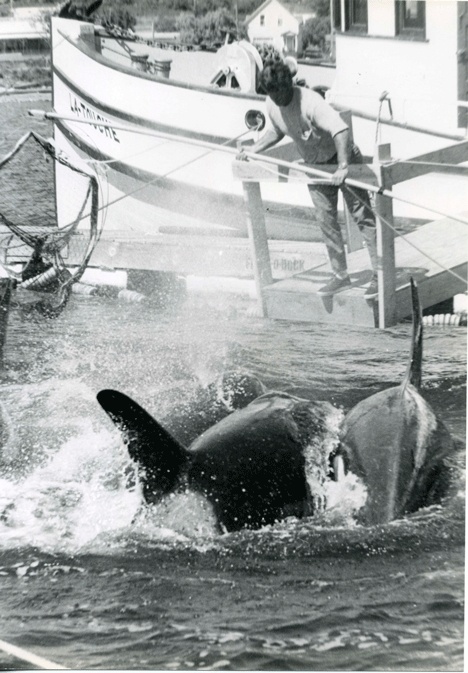On the 39th anniversary of the first Penn Cove orca capture, Orca Network on Sunday, Aug. 9, will hold its annual commemoration of all the Southern Resident orcas taken during the capture era, and honor Lolita, the only survivor, who lives alone at the Miami Seaquarium where she was delivered in 1970.
The event will take place from 4 to 7 p.m. at the Coupeville Recreation Hall, 901 NW Alexander St. It will feature historic KING TV news clips from the Penn Cove whale capture, narrated by the late Don McGaffin. Tickets costing $20 may be purchased at the door, or contact info@orcanetwork.org, or call 1-866-ORCANET.
According to a news release from the Greenbank-based Orca Network, much has changed in the lives of the Southern Resident orcas, or J, K and L pods. “Granny,” one of the elder females of J pod who is believed to be over 90 years of age, lived in a time when abundant chinook salmon runs provided plenty of food, the waters were clean and the habitat undisturbed. But the impacts of an ever-increasing human population has taken its toll on Granny and her family.
At one time humans feared the orcas, or “killer whales,” and they were commonly shot at or used for military target practice. Then in the 1960s and 70s, that fear changed to a realization that orcas were not dangerous killers, but were intelligent and trainable, and the marine park industry was born. During this period, 45 Southern Resident orcas were captured and delivered to marine parks, and another dozen or more were killed during the captures.
KING 5 reporter Don McGaffin happened to be on vacation in Coupeville during the 1971 orca capture, and ended up being “on assignment” along with KING 5 cameramen, to document the capture. Four or more orcas had died in Penn Cove during the first capture there in August 1970, so the captors were not very receptive to having media cover the capture. Longtime Secretary of State Ralph Munro recalls, “Many whales died during the capture era, and at one time McGaffin felt that the captors were trying to kill him for taking the photos. This film is unbelievable.”
These news clips recently surfaced, and include moving documentation of the whales being captured, commentary by McGaffin, and interviews with a diverse cross-section of politicians, biologists, and marine park personnel from the 1970s.
Finally in 1976 a count was taken of the remaining orca population, and it was discovered that one third to one half had been removed, all of them younger whales, the impacts of which are still felt today on this fragile, small population.
With just 71 orcas remaining, the captures were finally stopped, and the Southern Resident population slowly climbed to nearly 100 by the mid 1990s.
“But humans have continued to hamper the survival of the Southern Resident orcas,” said Susan Berta, Ora Network co-founder, in a news release. “Their population crashed to just 78 whales in 2001, due to salmon depletion, toxins in the water, and habitat disturbance, and they were listed as endangered under the Endangered Species Act in 2005.”
The orca population currently is around 86, and their survival still hangs in the balance.
In addition to a showing of the historic 1971 news clips, the Aug. 9 evening will include displays of photos of the 1970 Penn Cove capture by former Whidbey News-Times editor and publisher Wallie Funk, and Dr. Terry Newby, a waterside ceremony, silent auction, appetizers and beverages. Cost is $20 per person, with proceeds going to Orca Network educational programs and projects.
For more information, visit: http://www.orcanetwork.org/news/events.html.



